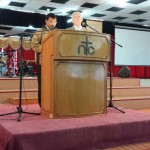A Rack Jobber? Perhaps you’ve not heard of the term. It’s a person who puts record products up on prominent racks in the record store in order to promote those records. They work in tandem with promoters. Ahhhh…. promoters. They were some of the great evangelists of the 70s who were never recognized as such. I remember very well the day in 1973 that Mr. Grand Funk Railroad promoter landed in the Record Bar in Charlotte. He was flogging the band’s new single ‘We’re an American Band’. Mark Farner (see the picture above) was the leader and lead singer-songwriter of the band, but that song was written by Don Brewer, the drummer. It went to no. 1, not least due to heavy promotion.
It didn’t really sound much like the heavier rock on the earlier albums especially the Red Album and the Closer to Home album, which were both excellent. GFR was a band from Flint Michigan, and of course that big hit single was sort of a push back against the British Invasion of the late 60s and early 70s. Mark Farner quite the band more than once, and today is a contemporary Christian artist with several Dove Awards. I would liken this band to Led Zepplin in both their style and their format (originally a three piece with only one guitar player, a bass player and a drummer). Those boys were LOUD and rocked heavy.
What did I learn from that promoter, with his huge pile of singles of ‘We’re an American Band’ which we were to entice record buyers with? Well first I learned that you don’t have to like the ‘evangelist’/promoter to be interested in the product. The song was a catchy top 40 single that people ended up not being able to get out of their heads. You play it 8-10 times and you end up singing along with it. So I learned that if you want somebody to buy something, it needs to have something about it that is inherently attractive, appealing, something that makes people want to investigate further on their own.
The second thing I learned was, it’s not about the promoter, its about the product, or put in Gospel terms its not about the apostle, its about the Gospel. Paul, for example, was not interested in creating a cult of personality, unlike many preachers I have run across. He was interesting in people embracing the Gospel and the savior it promoted— Jesus.
I will never remember the name of that promoter, but the name of the song and the band he was promoting, that’s different. I embraced the music as my own, learned it, and it became a part of me. That’s also the way the Gospel works, by the way. It needs to be presented in a way that the audience will find deeply moving or appealing. In short, if you want to win some, you have to be winsome in your message.
Thirdly, I learned you have to take it to the streets and offer it to the gate keepers for free. And that is exactly what the promoters did for a single like that— they came to us, we did not have to go to them to get it. They were like door to door Mormon missionaries, full of energy and zeal. They also realized that one should ‘evangelize’ the gate keepers first and offer it to them for free.
The Record Bar got lots of free copies of ‘We’re an American Band’. We all got a copy to take home and play and try out. For those who were already rock music lovers this was like pouring gasoline on an already raging fire. And of course long after the promoter had moved on, we in the store had become the evangelists for the new hit song, and yes…. we sold a ton of them,initially could hardly keep them in the store.
Now of course, selling records is only in some ways similar to sharing the Gospel. But there is something to be learned from the promoters hawking their wares. They too had learned how to become all things to all people so that by some means they might win many. So let’s go back to Paul again for a minute in closing.
If you study Paul’s modus operandi carefully, both in Acts and his letters, it is clear enough that he tries to approach and convert the gate-keepers first. He approaches more high status person, who have homes where a new Christian meeting could be held. He converts former synagogue leaders, city treasurers, owners of a purple cloth dying business, and so on. In a stratified and status conscious world he knew that some people were the gate-keepers of society, and he approached them first when he went to a new town. Yes, there is something to be learned from record promoters, for the sake of the spread of the Gospel. Just ask Mark Farner, he’ll tell you.














